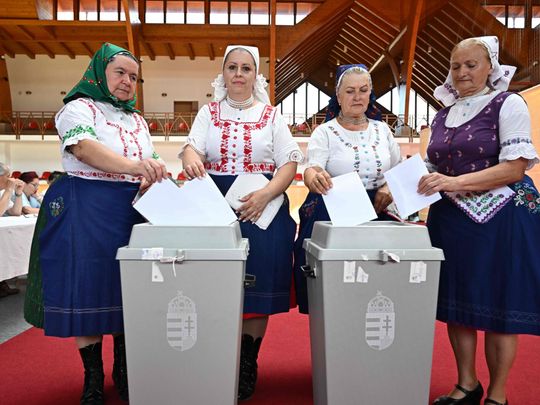European Parliament set for shift to the right as final votes cast

BRUSSELS: Voters in 21 EU countries including France and Germany were casting their ballots on Sunday in an election for the European Parliament that is expected to shift the assembly to the right and boost the numbers of eurosceptic nationalists.
The election will shape how the European Union, a bloc of 450 million citizens, confronts challenges including increased industrial rivalry from China and the United States, climate change and immigration.
Voting began on Thursday in the Netherlands and in other countries on Friday and Saturday, but the bulk of EU votes were to be cast on Sunday, with France, Germany, Poland and Spain opening the polls and Italy holding a second day of voting.
Casting her ballot, the leading candidate for Spain’s conservative People’s Party Dolors Montserrat, said the election would “decide the future of Spain and the future of Europe”.
The centre-right European People’s Party (EPP) is set to remain the European Parliament’s largest group, putting its candidate to head the European Commission, incumbent Ursula von der Leyen of Germany, in pole position for a second term.
Why vote is important?
Around 360 million people in the European Union voted in the bloc-wide election, which will decide the 720 lawmakers in the parliament for the next five years.
The assembly adopts and amends EU legislative proposals and, importantly, votes on who will become the next European Commission president.
However, she may need support from some right-wing nationalists, such as Italian Prime Minister Giorgia Meloni’s Brothers of Italy, to secure a parliamentary majority, giving Meloni and allies more leverage.
Parliament as a whole will also vote and often amend a slew of legislation expected in the next five years. The shift right means it may be less enthusiastic on climate change policies and the reforms required for EU enlargement, while eager on measures to limit immigration.
LATEST POLLS
A projection by Europe Elects pollster on Sunday showed the EPP could gain five seats compared to the last parliament to win a total of 183. The Socialists, who include German Chancellor Olaf Scholz’s party, are seen losing four seats to get 136.
European Greens, facing a backlash from hard-pressed households, farmers and industry over costly EU policies limiting CO2 emissions, look set to be among the big losers with the poll on Sunday giving them only 56 deputies, a loss of 16.
Forecasts for the liberal group Renew Europe are also grim, given the expectation that Marine Le Pen’s far-right Rassemblement National will trounce French President Emmanuel Macron’s centrist Renaissance in France.
The Sunday poll put the Renew group’s losses at 13 seats, forecasting it will end up with 89.
In contrast, the poll said the national-conservative ECR was likely to get five more deputies for a total of 73 and the far-right ID group could get eight more seats for a total of 67.
More deputies could join the right and far-right groups from among the so far non-affiliated deputies of whom there would be 79, the poll said.
At a polling station in northern Paris, 18-year-old student Elisa Dubois said she was concerned about the rise of the far right across Europe.
“So if we also do it in France, they can unite and it is quite dangerous,” she said.
The European Parliament will issue an EU-wide exit poll at around 2030 CET (1830 GMT) and then a first provisional result after 2300 CET when the final votes, in Italy, have been cast.
SHIFT RIGHT
The expected losses by pro-European liberals and Greens, will reduce the majority of the centre-right and centre-left and complicate efforts to push through new EU laws or increase European integration.
Many voters have been hit by the cost of living, have concerns about migration and the cost of the green transition and are disturbed by geopolitical tensions, including war in Ukraine.
Hard and far-right parties have seized on this and offered the electorate an alternative.
“Whoever believes that we need a change of course and that things can be done much better in Brussels has only one alternative, which is Vox,” the leading candidate for the far-right Spanish party, Jorge Buxade, said after voting in Madrid.
In the Netherlands, exit polls on Thursday showed nationalist Geert Wilders’ anti-immigration party was set to win seven of the 29 Dutch seats in the EU assembly, from zero in 2019, after his large win in last year’s national election.
His Freedom Party will be just one short of the combined seats of a Socialist Democrat-Greens alliance.
In Belgium, voters also elect federal and regional chambers on Sunday and are forecast to back far-right Flemish separatist party Vlaams Belang in record numbers, although it could still be kept from office by other parties.
The government of Prime Minister Alexander De Croo will likely stay in office in a caretaker capacity for many months until a new multi-party coalition is formed.
Related
A New Book Argues That What Happens in Europe Doesn’t…
Remaking the World: European Distinctiveness and the Transformation of Politics, Culture, and the Economy by Jerrold Seigel “No issue in world
Poland plans military training for every adult male amid growing…
Poland’s prime minister, Donald Tusk, has said his government is working on a plan to prepare large-scale military training for every adult male in response t
2025 European Athletics Indoor Championships: Ditaji Kambundji secures women’s 60m…
Switzerland’s Ditaji Kambundji walked away from the 2025 European Athletics Indoor Championships in Apeldoorn on 7 March with much more than her first Europea
Takeaways from the EU’s landmark security summit after Trump said…
BRUSSELS (AP) — European Union leaders are trumpeting their endorsement of a plan to free up hundreds of billions of








